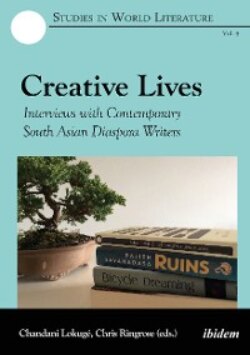Читать книгу Creative Lives - Группа авторов - Страница 4
ОглавлениеForeword
Janet Wilson
The pleasure of reading these fascinating interviews with writers and artists cannot be underestimated. The interview is a way to hear their voices in dialogue with empathetic, discerning readers and interpreters of their work. It offers a snapshot of the writers’ world view as it has determined their writing and life moves, and the particular choices they have made. Such motivations towards developing a hybrid narrative voice on the part of the 18 South Asian diasporic writers who appear in this volume hinge on their decision to migrate from their homelands. Since they are exiles and migrants, their journeys are constitutive of the multidirectional trajectories comprising the many South Asian diasporas that extend across the globe: collectively the world’s largest diaspora today.
This collection represents a shop-front for the work of the South Asian Diaspora Researchers’ Network (SADIRN) established at Monash University, Australia in 2016. It stems from an ongoing project that involved network members and affiliates in discussion with transnational, global writers, both in Australia and beyond, and reflects the oversight and commitment of its Director Chandani Lokuge, and her co-editor of this volume, Chris Ringrose. Its range of interviews reflects SADIRN’s international relations with European research groups such as that run by Frank Schulze-Engler at the University of Frankfurt and the European Association for Australian Studies (EASA). There is also its fruitful liaison with the journal Wasafiri, through its founding-editor Susheila Nasta, which over the last 35 years has pioneered landmark interviews with writers from “other” cultures.
Creative Lives is an illustrious extension of Wasafiri’s tradition of fostering these literatures: it features writers who have relocated in diverse European, Australian and US centres yet retain ties with their homelands in Bangladesh, India, Nepal, Pakistan, Sri Lanka and Tibet. Alongside interviews with writers shortlisted for the Man Booker Prize are conversations with writers who are national and international prize-winners, or have been shortlisted for prestigious grants and awards.
In their excellent, wide-ranging introduction, Lokuge and Ringrose, who like many of the interviewees are creative writers as well as essayists, critics and scholars, draw attention to the liminality implicit in the act of interviewing. The interviews themselves demonstrate the contrapuntal diasporic subjectivity that arises from living in two or more cultures, which is refracted in narrative practices of hybrid, transcultural, transnational writing, and the shaping discourses of movement and resettlement. The dual focus on movement to new countries like Australia, Canada, France, the UK and USA, alongside the ongoing pull of homeland issues and cultures, suggests their work may be read according to some mix of postcolonial and world literature writing categories, as proposed by Stephan Helgesson (2014), insofar as they are concerned with “local conflictual histories” and their transcultural production belongs to a “circulational phenomenon that moves across languages and literary fields” (484).
The challenges faced by these writers converge on the crux for all migrants, whether voluntary, exiled, refugee or asylum seeker: national borders, visas, entry permits, and policies of exclusion, as well as the related question of whether cultures’ “others” are perceived as located within the nation or as aliens threatening from outside. As a liminal act each one of these 18 interviews is constructed from the writer’s re-experience and recreation in words of a material reality—the vicissitudes of migration and dislocation due to political and cultural pressures, and the struggle between familial, national ties and affiliative urges—and each depends for its animation and direction on the synchronicities and affinities between interviewer and interviewee.
Creative Lives reinforces the special value of the interview at a time of devastation wrought by the COVID-19 pandemic, and by political upheavals across the globe. In this era of fake news, shrinking borders, and global uncertainty, our minds are being rewired, our antennae of curiosity and enquiry activated differently. Such reconfiguring processes and increased connectivity between people due to mobile technology— video teleconferencing services like Zoom, TV and video streaming services, and social media networking—have been reinforced by social isolation and national lockdowns. The interview format contributes to this greatly enhanced access to information that enables us, as readers, consumers, and co-producers of knowledge, to choose how to think more critically.
Bibliography
Helgesson, Stephan. 2014. “Postcolonialism and World Literature: Rethinking the Boundaries.” Interventions 16 (4): 483–500.
